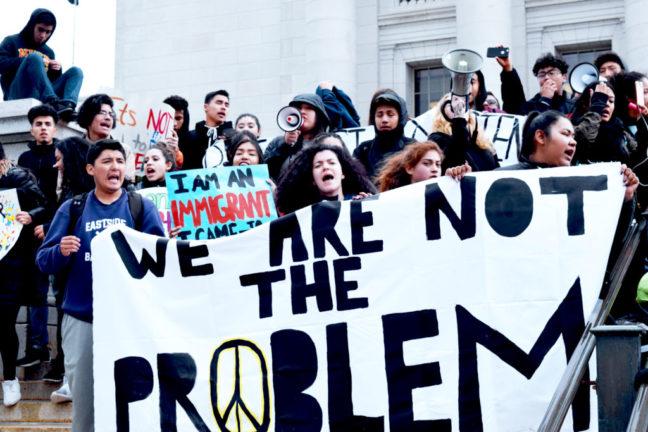Hundreds gathered at the Capitol Monday for International Workers’ Day to call for a higher minimum wage, better working conditions and an end to attacks on unions.
For this year’s International Workers’ Day, in light of President Donald Trump’s administration’s immigration policy reforms, the march rallied specifically for marginalized community members in “A Day without Immigrants and Refugees.”
The marchers gathered in two locations: University of Wisconsin Library Mall and Brittingham Park. UW and high school students gathered largely at Library Mall, while community members gathered at Brittingham Park.
Marchers ended at the Capitol to express their dismay over current workers’ rights issues to state legislators.
About 400 assembled for the march without incident, according to a Madison Police Department incident report.
Over 20 artists, performers and community leaders delivered messages to the marchers, emphasizing social welfare and workers’ rights.
In the opening speech, Claudia Gonzalez from the Immigrant Workers Union expressed the need to raise the minimum wage to $15.
“We can see that in one way or another things haven’t changed because the 1 percent has always quieted us with false promises,” Gonzalez said. “[The 1 percent] want [immigrants] to survive with the minimum wage pay, having us to work two to three jobs because it’s impossible to survive with the minimum wage pay of $7.25 per hour.”
Alex Gillas, one of the lead organizers of the march, said the main objective was to raise awareness that the public is tired of policies benefitting corporations, not people.
Gillas said he expected public discontentment with Trump’s stances toward immigrants to boost the rally’s attendance since immigrants feel the effects of these discriminatory policies.
“This year is more important than many others because President Trump said he has decided to do things better for us, but it’s actually way worse,” Gillas said. “It’s true we don’t have any legislation right now… [but] just the rhetoric involving the wall is dangerous to society.”
Activist Shadayra Kilfoy-Flores said she came to the march because many of her family members also experience discrimination in Madison.
But Kilfoy-Flores said she still believes the Madison community can change.
“I feel that it’s my responsibility, because I’m documented, to stand up for those who are not,” Kilfoy-Flores said.


